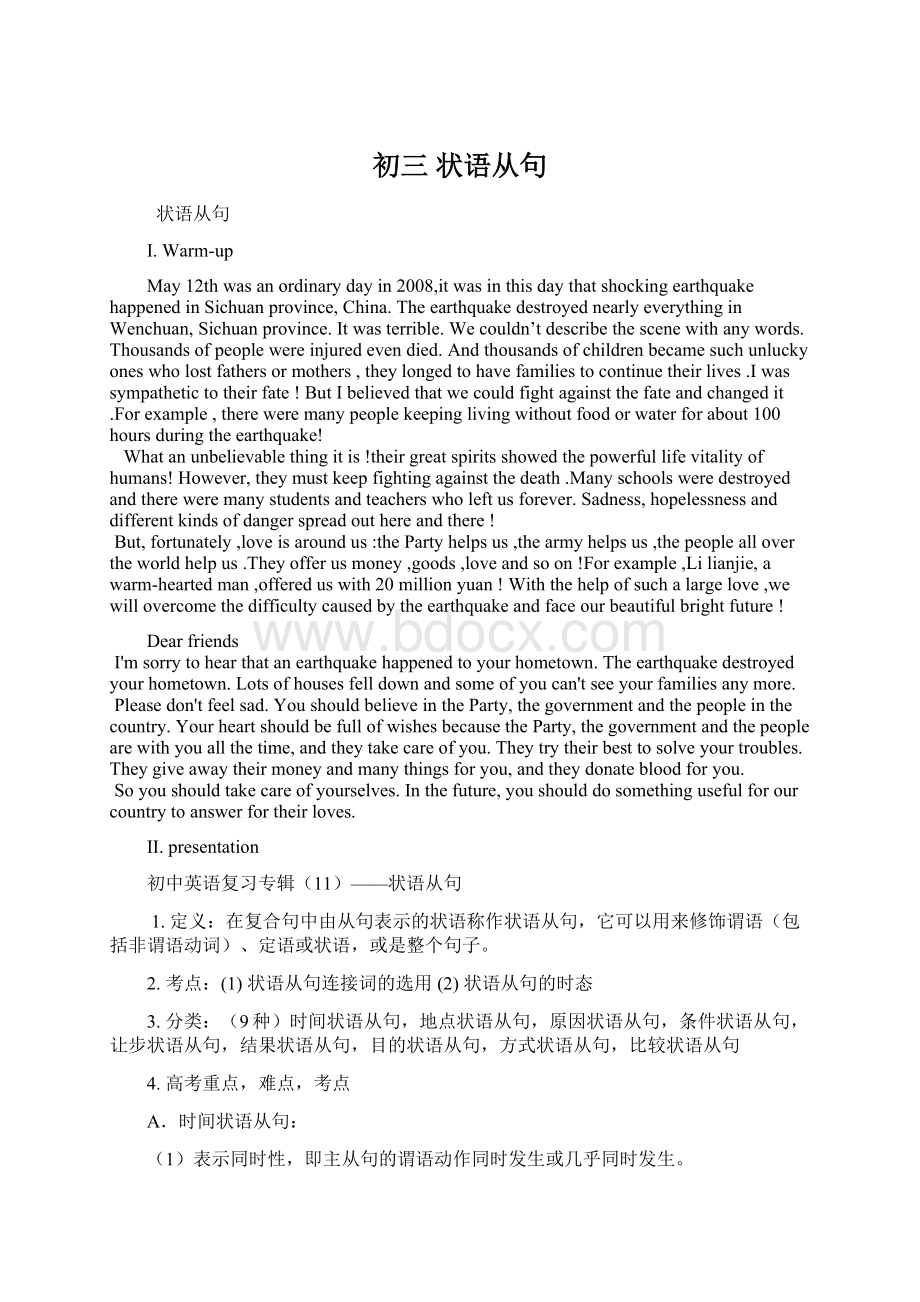初三状语从句.docx
《初三状语从句.docx》由会员分享,可在线阅读,更多相关《初三状语从句.docx(16页珍藏版)》请在冰豆网上搜索。

初三状语从句
状语从句
I.Warm-up
May12thwasanordinarydayin2008,itwasinthisdaythatshockingearthquakehappenedinSichuanprovince,China.TheearthquakedestroyednearlyeverythinginWenchuan,Sichuanprovince.Itwasterrible.Wecouldn’tdescribethescenewithanywords.Thousandsofpeoplewereinjuredevendied.Andthousandsofchildrenbecamesuchunluckyoneswholostfathersormothers,theylongedtohavefamiliestocontinuetheirlives.Iwassympathetictotheirfate!
ButIbelievedthatwecouldfightagainstthefateandchangedit.Forexample,thereweremanypeoplekeepinglivingwithoutfoodorwaterforabout100hoursduringtheearthquake!
Whatanunbelievablethingitis!
theirgreatspiritsshowedthepowerfullifevitalityofhumans!
However,theymustkeepfightingagainstthedeath.Manyschoolsweredestroyedandthereweremanystudentsandteacherswholeftusforever.Sadness,hopelessnessanddifferentkindsofdangerspreadouthereandthere!
But,fortunately,loveisaroundus:
thePartyhelpsus,thearmyhelpsus,thepeopleallovertheworldhelpus.Theyofferusmoney,goods,loveandsoon!
Forexample,Lilianjie,awarm-heartedman,offereduswith20millionyuan!
Withthehelpofsuchalargelove,wewillovercomethedifficultycausedbytheearthquakeandfaceourbeautifulbrightfuture!
Dearfriends
I'msorrytohearthatanearthquakehappenedtoyourhometown.Theearthquakedestroyedyourhometown.Lotsofhousesfelldownandsomeofyoucan'tseeyourfamiliesanymore.
Pleasedon'tfeelsad.YoushouldbelieveintheParty,thegovernmentandthepeopleinthecountry.YourheartshouldbefullofwishesbecausetheParty,thegovernmentandthepeoplearewithyouallthetime,andtheytakecareofyou.Theytrytheirbesttosolveyourtroubles.Theygiveawaytheirmoneyandmanythingsforyou,andtheydonatebloodforyou.
Soyoushouldtakecareofyourselves.Inthefuture,youshoulddosomethingusefulforourcountrytoanswerfortheirloves.
II.presentation
初中英语复习专辑(11)——状语从句
1.定义:
在复合句中由从句表示的状语称作状语从句,它可以用来修饰谓语(包括非谓语动词)、定语或状语,或是整个句子。
2.考点:
(1)状语从句连接词的选用
(2)状语从句的时态
3.分类:
(9种)时间状语从句,地点状语从句,原因状语从句,条件状语从句,让步状语从句,结果状语从句,目的状语从句,方式状语从句,比较状语从句
4.高考重点,难点,考点
A.时间状语从句:
(1)表示同时性,即主从句的谓语动作同时发生或几乎同时发生。
其连词有:
when(当……的时候),while(当……的时候),as(当……的时候),once(一旦……)assoonas(一……就……),thetime(当……的时刻),themoment(当……的时刻),bythetime(到……时候为止),nexttime(下次),thefirsttime(第一次……的时候),thelasttime(上次……的时候),immediately(一……就……),instantly(一……就……),directly(一……就……)以下关联词引起的句子中,前面常用过去完成时,后面用一般过去时hardly/scarcely…when…=nosooner…than…(一……就……)
Strikewhiletheironishot.趁热打铁。
WhileIamwashingthefloor,youcanbecleaningthewindows.我洗地板的时候,你可以擦窗户。
As/WhenIcamehome,Imetanoldschoolmateofmine.我回家的时候遇到了我的一位老同学。
I’llringyouupassoonasIgetananswerfromhim.我一有他的答复就给你打电话。
Onceyouseehim,youwillneverforgethim.你一旦见过他,就不会忘了他的。
Hardlyhadwegotintothecountrywhenitbegantorain.我们一到乡下就开始下雨了。
=Wehadhardlygotintothecountrywhenitbegantorain.
Nosoonerhadhecomehomethanshestartedcomplaining.他一到家她就开始抱怨。
=Hehadnosoonercomehomethanshestartedcomplaining.
Hemadeforthedoordirectlyheheardtheknock.他一听到敲门声就向门口走去。
Sherushedintotheroomimmediately/themomentsheheardthenoise.她一听到声音就冲进房间
HeleftmeagoodimpressionthefirsttimeImethim.我第一次见他时,他给我留下了好印象。
Hehadnosoonerarrivedtherethanhefellill.他刚到达那里就生起病来。
Hehadhardlyfinishedwhensomeonerosetorefutehispoints.他还没说完就有人起来反驳他的论点
Shehadscarcelyfallenasleepwhenaknockatthedoorawakenedher.她刚要睡着,忽然敲门的声音把她惊醒。
★as、when、while用法一览表
类别
作用
例句
As
as表示“当……的时候”,往往和when/while通用,但它着重强调主句与从句的动作或事情同时或几乎同时发生。
如果从句和主句要表示一个人的两个动作交替进行或同时完成时,则多用as,可译为“一边......,一边......”
ShecameupasIwascooking.(同时)
Therunnersstartedasthegunwentoff.(几乎同时)
Helookedbehindfromtimetotimeashewent.
他一边走,一边不时地往后看。
Astimegoeson,it’sgettingwarmerandwarmer..随着时间的推移,天气变得越来越暖了。
when
(atorduringthetimethat)既可以表示在某一点的时候,又可表示在某一段时间内,主句与从句的动作或事情可以同时发生也可以先后发生。
如果表示从句的动作在主句的动作“之前”或“之后”发生时,多用when(=after),不用as或
while。
此外,when还含有“atthatmoment”的意思(=andthen),引起的句子不能放在句首,也不能用as,while来替换。
Itwasrainingwhenwearrived.(指时间点)
Whenwewereatschool,wewenttothelibraryeveryday.(在一段时间内)
WewerewatchingTVwhensuddenlythelightswentout.我们正在看电视,这时灯突然灭了。
Theyhadjustarrivedhomewhenitbeganto
rain.他们刚到家,这时天就开始下雨了。
while
while意思是“当……的时候”或“在某一段时间里”。
主句中的动作或事情在从句中的动作或事情的进展过程中发生,从句中的动词一般要用延续性动词。
在when表示aperiodoftime时,两者可以互换。
当主从句之间表示转折或对比关系时,多用while,不用as或when
Pleasedon’ttalksoloudwhileothersareworking.
Hefellasleepwhile/whenreading.
Strikewhiletheironishot.(用as或when不可,这里的while意思是“趁……”)
ShethoughtIwastalkingaboutherdaughter,whileinfact,Iwastalkingaboutmydaughter.她以为我在谈论她女儿,而事实上,我在谈论我的女儿。
(2)表示先时或后时,即主句的谓语动作发生在从句之前或之后。
主要连词有:
after(在……之后,before(在……之前),when(=after)等。
如:
After/Whenthechildrenhadgonetobed,shebegantoprepareherlessons.
孩子睡觉了以后她开始备课。
(从句的动作发生在主句的动作之前,所以从句用了过去完成时)
HehadlearnedEnglishforthreeyearsbeforehewenttoLondon.他去伦敦之前已学了三年英语。
(主句的动作发生在从句的动作之前,所以主句用了过去完成时)
常用句型:
Itis/was/willbe…before…要过多久才…
Itwillbeanotherfivedaysbeforewefinishthistask.还要再过5天我们才能完成这个任务。
Itisn’t/wasn’t/won’tbe…before…没有过多久就…
ItwasnotlongbeforeIforgotitall.我没有过多久就全忘了。
HeranoffbeforeIcouldstophim.(主句和从句的动作几乎同时发生,时态一致)
我还没来得及阻止他他就跑掉了。
(注意before在汉语中的译义)
(3)表示习惯性、经常性,即从句描述的不是一次性动作,而是经常发生的习惯性动作。
主要连词有everytime(每次),eachtime(每次),whenever(每当)等。
Wheneverwemetwithdifficulties,theycametohelpus.每当我们遇上困难的时候他们就来帮我们
Eachtimehecametotownhewouldvisitourschool.他每次进城,总要来看看我们的学校。
EverytimeIwenttohishouse,hewasout.我每次去他家,他都出去了。
(4)表示持续性或瞬间性
主要连词有:
since(自从),eversince(自从),until(直到……才/为止,till(直到……才/为止)
常用句型:
Itis…since…
Itisjustaweeksincewearrivedhere.我们到这儿刚刚一星期。
(主句的动作或状态持续时间较短,不能用eversince)
YouhavebeenreadingtomeeversinceJameswentout.自从James走后你一直在给我朗读。
(ever放在since之前是用来表示说话者强调主句动作或状态持续时间长)
Thebigclockwhichusedtostrikethehoursdayandnightwasdamagedduringthewarandhasbeensilenteversince.(eversince可以放在句末,since则不能)
这只一向日夜不停打点报时的大钟在战争中损坏了,从此就一直不响了。
MyunclewenttoTibetin1951.Hehasbeenlivingthereeversince.我叔叔于1951年去了西藏,从那以后他一直生活在那里。
Thingswentwelluntil/tillonenightanaccidenthappened.事情一切正常直到一天晚上发生意外
Iknewnothingaboutituntil/tillhetoldme.他告诉我了我才知道。
★until与till及not…until/till的用法
①until和till都可表示“直到......为止”,与持续性动词的肯定式连用。
如:
Hewaiteduntil/tillwefinishedourmeal.他一直等到我们吃完饭。
②当until和till表示“直到......才......”时,通常与短暂动词的否定式连用,这时,until和till也可用before代替。
如:
Ididn’tleaveuntil/till/beforeshecameback.直到她回来,我才离开的。
③be动词的肯定式和否定式都可以和until或till连用。
④until引导的从句可以放在主句之前或主句之后,但till从句一般不放在句首。
如:
Untilhetoldme,Iknewnothingaboutit.他告诉我了我才知道。
当notuntil位于句首时,主句中的主语、谓语要使用倒装语序:
NotuntilshecamebackdidIleave.=Ididn’tleaveuntilshecameback.
在强调句型中一般用until,不用till。
如:
ItwasnotuntilshetookoffherdarkglassesthatIrealizedshewasafamousfilmstar.
B.地点状语从句
地点状语从句是由where(在……的地方),wherever(无论哪里)引导的:
WuhanlieswheretheYangtzeandtheHanRivermeet.武汉位于长江和汉水汇合处。
Wherethereisawill,thereisaway.有志者,事竟成。
You’dbettermakeamarkwhereyouhaveanyquestions.哪儿有问题,你最好在哪儿做个记号。
Hewouldkeepintouchwithuswhereverhewas.他无论在什么地方,总是与我们保持联系。
C.原因状语从句
表示原因的状语从句可以由as(由于),because(因为),since(既然),now(that)(既然),for(由于)consideringthat(顾及到),seeingthat(由于)等连词引导:
IdoitbecauseIlikeit.因为我喜欢我才干。
(because不能与so连用)
Hecouldn’thaveseenme,becauseIwasnotthere.他不可能见过我,因为当时我不在那儿。
Seeing(that)quiteafewpeoplewereabsent,wedecidedtoputthemeetingoff.由于好些人都没到会,我们决定延期开会
Nowthat/Sinceyouareallhere,let’stryandreachadecision.既然大家都来了咱们就设法做一个决定吧
Asshewasill,shedidn’tcometotheparty.由于病了,她没来参加晚会。
Consideringthattheyarejustbeginners,theyaredoingquiteagoodjob.考虑到他们才刚刚学做,他们干得算很不错的了
★because,as,for,since的区别
类别
用法
例句
because
because语气最强表示不知道的原因时用because,即说话人认为听话人不知道,因此because从句是全句最重要的部分,通常它被置于主句之后。
下列情况下只能使用because:
①在回答why的问句时;②在用于强调句型时;
③被not所否定时。
YouwanttoknowwhyI’mleaving?
I’mleavingbecauseI’mfull.
for
for的语气不及because,since,as强,为并列连词,引导的分句常放在主句之后,从句前通常用逗号,表示说话者为所做的推断和预测提供理由,或对前一分句进行补充和解释。
如果不是因果关系,而是对前面主句的内容加以解释或推断时,只能用for。
It’smorningnow,forthebirdsaresinging.(很显然,鸟叫不可能是“现在已是早上”的原因。
)
as/since
表示已经知道的原因时用as或since,即某种原因在说话人看来已经很明显,或已为听话人所熟悉,因此它是句中不很重要的部分。
since要比as正式一些,它们通常被置于语句之前,但有时却相反。
Seeingallofthechildrenalreadyseated,hesaid,“Sinceeveryoneishere,let’sstart.”
D.目的状语从句
引导目的状语从句的主要连词有:
sothat(以便),inorderthat(为了),forfearthat(以便),目的状语从句的谓语动词常与情态动词can,could,may,might,should连用
Let’stakethefrontseats(so)thatwemayseemoreclearly.我们坐前排吧,这样我们看得更清楚些。
Schoolwasclosedearlyinorderthatthechildrenmightgohomeaheadofthestorm.
早点儿放学是为了让孩子们在暴风雨到来之前回家。
Hetookthenamedownforfearthatheforgetit.他把名字写下省得忘了。
Bettertakemoreclothesincasetheweatheriscold.最好多带些衣服以防天气会冷。
E.结果状语从句
引导结果状语从句的连词有:
that,sothat(从句中不带情态动词),so…that(如此……以致……),
such…that(如此……以致……)等。
Whathashappenedthatyoualllooksoexcited?
发生了什么事,使你们都显得如此兴奋?
Hedidn’tplanhistimewell,sothat/sohedidn’tfinishtheworkintime.他没把时间计划好,结果没按时完成这项工作。
Weleftinsuchahurrythatweforgottolockthedoor.我们走得匆忙,把门都忘了锁了。
Thevillageissosmallthatitcannotbeshowninthemap.这村子太小,所以这地图上没有。
Jennyissuchaclevergirlthatalltheteacherslikeherverymuch=Jennyissocleveragirlthatalltheteacherslikeherverymuch.Jenny是如此聪明的女孩,以至老师们都非常喜欢她。
注意:
so+形容词/副词+that从句;such+ 名词+that从句。
但是,当名词前有many,much,few,little(少)修饰时,要用so,不能用such。
IhavehadsomanyfallsthatIamblackandblueallover.我摔了许多跤,以至于浑